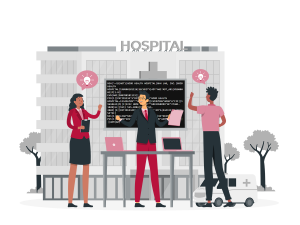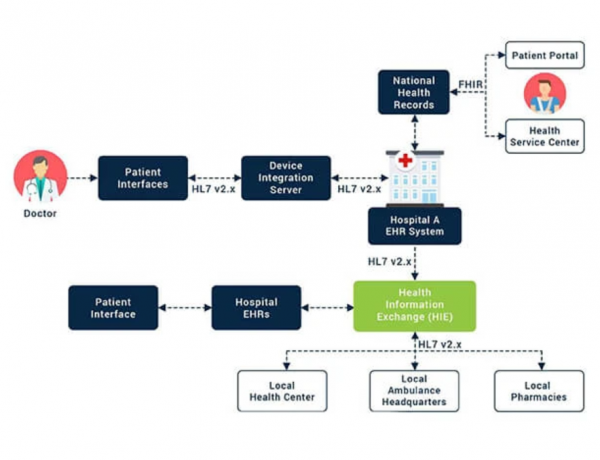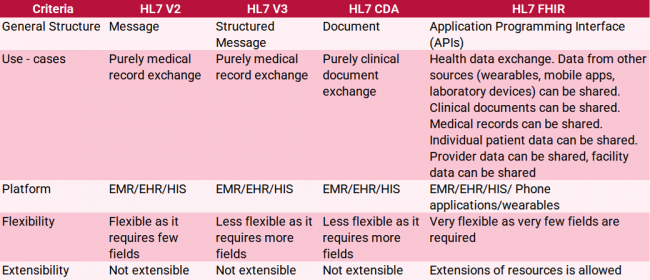
Seamless data exchange is crucial for efficient communication between disparate systems and delivering optimal patient care in today’s rapidly evolving healthcare landscape. A key component to achieving this level of interoperability is the Health Level Seven International (HL7) messaging standard. However, implementing and integrating HL7 can be a complex and daunting task for healthcare organizations. This is where expert guidance in the form of HL7 integration consulting becomes invaluable.
HL7 integration consulting encompasses a broad range of services, from assessing existing systems and workflows to customizing interfaces and providing ongoing support. Engaging experienced consultants can significantly streamline the HL7 implementation process, helping healthcare organizations overcome the challenges of data exchange and optimize their systems for improved patient outcomes. This article aims to highlight the importance of HL7 integration consulting in achieving healthcare interoperability and the benefits it offers to healthcare organizations.
We will discuss the role of HL7 messaging standards in healthcare interoperability, the key components of HL7 integration consulting, and the advantages of partnering with an experienced consultant. Additionally, we will touch upon the future of healthcare interoperability with a focus on emerging trends and technologies. By the end of this article, you will have a comprehensive understanding of how HL7 integration consulting can support your organization in navigating the complexities of healthcare data exchange and achieving true interoperability.
The role of HL7 in healthcare interoperability
Health Level Seven International messaging standards play a pivotal role in healthcare interoperability, facilitating seamless data exchange between different healthcare systems. As healthcare organizations increasingly rely on digital systems to manage patient information, the need for effective communication and data sharing between various electronic health record (EHR) systems, laboratory information systems (LIS), and other healthcare applications has become crucial.
HL7 messaging standards are designed to address this need by providing a standardized framework for exchanging clinical and administrative data between systems. These standards encompass a variety of data formats and messaging protocols, with HL7 Version 2.x being the most widely adopted due to its flexibility and significant market presence.
The use of HL7 messaging standards ensures that healthcare data can be accurately transmitted, received, and interpreted by different systems, reducing the risk of errors and enhancing patient care. This level of interoperability is essential in enabling healthcare organizations to deliver integrated care and meet the evolving needs of patients and providers.

However, implementing HL7 solutions can be challenging for healthcare organizations. The complexity of integrating various systems, customizing HL7 interfaces, and ensuring compliance with regulatory requirements often necessitate specialized knowledge and expertise. Additionally, HL7 messaging standards are constantly evolving, with newer versions and technologies like Fast Healthcare Interoperability Resources (FHIR) emerging to address the changing demands of the healthcare industry.
These challenges underscore the importance of HL7 integration consulting for healthcare organizations seeking to achieve true interoperability. By leveraging the expertise of experienced consultants, healthcare organizations can navigate the intricacies of HL7 implementation, streamline data exchange, and ultimately deliver better patient care.
HL7 integration consulting fundamentals
HL7 integration consulting services aim to help healthcare organizations overcome the challenges associated with implementing HL7 messaging standards and achieve seamless interoperability. By offering a comprehensive approach to HL7 integration, consultants can address various aspects of the process, ensuring that healthcare organizations can fully benefit from the potential of HL7 messaging standards. Some of the key components of HL7 integration consulting include:
System assessment
An initial assessment of the organization’s existing systems, infrastructure, and workflows is a critical first step in the integration process. By analyzing the current state, consultants can identify any gaps, inefficiencies, and potential areas for improvement, as well as evaluate the organization’s readiness for HL7 integration. This assessment helps determine the most effective approach to implementing HL7 messaging standards, taking into account the unique needs and goals of the organization.
Workflow optimization
HL7 integration consulting services typically include workflow optimization to ensure that the organization’s processes are streamlined for effective data exchange. Consultants work closely with healthcare providers to review existing workflows, identify bottlenecks, and suggest improvements that align with industry best practices. By optimizing workflows, healthcare organizations can enhance their overall efficiency and the quality of patient care.
Custom interface development
Every healthcare organization has unique requirements and system configurations, necessitating the development of custom HL7 interfaces to facilitate seamless data exchange. HL7 integration consultants possess the technical expertise to design, develop, and implement tailored interfaces that adhere to the HL7 messaging standards. This customization ensures that healthcare organizations can effectively communicate and exchange data with various systems, both internally and externally.
Ongoing support
Implementing HL7 messaging standards is not a one-time task. It requires ongoing maintenance, updates, and support to ensure continued interoperability and compliance with evolving industry standards. HL7 integration consultants typically offer ongoing support services, including system monitoring, troubleshooting, and updates, to ensure that the organization’s HL7 infrastructure remains functional and up-to-date. This long-term support is crucial in enabling healthcare organizations to maintain effective data exchange and adapt to the ever-changing healthcare landscape.

The benefits of partnering with an HL7 integration consultant
Healthcare organizations that choose to work with experienced HL7 integration consultants stand to gain numerous advantages in their pursuit of improved interoperability and more efficient data exchange. By leveraging the expertise of HL7 consultants, these organizations can enjoy benefits such as enhanced data exchange efficiency, streamlined workflows, and improved patient care. Some of the key advantages of partnering with an HL7 integration consultant include:
Enhanced data exchange efficiency
HL7 integration consultants possess the technical knowledge and experience necessary to design, develop, and implement HL7 interfaces that adhere to industry standards. By implementing HL7 messaging standards effectively, healthcare organizations can ensure seamless communication between various systems, both internally and externally. This improved efficiency in data exchange can lead to more accurate and timely decision-making, better resource allocation, and ultimately, higher quality patient care.
Improved patient care
Implementing HL7 messaging standards and optimizing workflows contribute to an enhanced patient experience. With more accurate and timely data exchange, healthcare providers can make better-informed decisions about patient care, resulting in more personalized and effective treatment plans. Additionally, streamlined workflows can help reduce wait times and administrative burdens, further improving the patient experience.
Access to industry expertise
By partnering with an experienced HL7 integration consultant, healthcare organizations can tap into a wealth of industry knowledge and best practices. This expertise can help organizations stay ahead of the curve in terms of technological advancements, regulatory compliance, and evolving industry standards, ensuring that they are well-equipped to adapt to the ever-changing healthcare landscape.
Cost savings
Investing in the services of an HL7 integration consultant can result in long-term cost savings for healthcare organizations. By streamlining workflows and implementing efficient HL7 interfaces, organizations can reduce the time and resources spent on manual data entry and error correction. Additionally, ongoing support from consultants can help prevent costly system failures and downtime, ensuring the continued functionality of the organization’s HL7 infrastructure.
The future of healthcare interoperability
As the healthcare landscape continues to evolve, so too do the trends and technologies that drive healthcare interoperability. The future of healthcare interoperability is heavily influenced by the emergence of new standards and technological advancements, with one of the most notable developments being the FHIR standard. What is the potential impact of these emerging trends on healthcare interoperability?
FHIR transformation
FHIR was developed to address some of the limitations of the existing HL7 standards, including HL7 v2.x and HL7 v3. Its aim is to simplify the integration process and improve interoperability by using a modular, extensible, and web-based approach. As FHIR gains even more traction in the healthcare industry, organizations will need to consider how to integrate FHIR into their existing systems or transition to FHIR-based solutions. HL7 consultants can provide invaluable guidance and support in this process, ensuring a smooth transition and the successful implementation of FHIR-based solutions.
API-driven interoperability
The growing adoption of Application Programming Interfaces (APIs) is another significant trend shaping the future of healthcare interoperability. APIs provide a standardized way for different systems to communicate with each other, making it easier to exchange data and integrate disparate systems. HL7 integration consultants can help organizations leverage APIs to enhance their interoperability capabilities, design custom APIs, and ensure that their systems are compatible with emerging industry standards.
Big data and analytics
As healthcare organizations continue to generate massive amounts of data, the need for advanced analytics and data-driven decision-making becomes increasingly important. HL7 integration consultants can assist in designing and implementing data integration strategies that enable organizations to harness the power of their data, unlocking valuable insights and driving more informed decision-making processes.
Conclusion
HL7 integration consulting plays a crucial role in helping healthcare organizations achieve seamless data exchange, streamline workflows, and ultimately improve patient care. By partnering with experienced HL7 consultants, organizations can successfully navigate the complexities of healthcare interoperability, ensuring that their systems are compatible with industry standards and capable of adapting to the ever-changing landscape.
As a leading Seattle-based healthcare software development company, Itirra is well-positioned to provide expert guidance and support in HL7 integration consulting. Our team of seasoned professionals has extensive experience in healthcare interoperability, custom interface development, workflow optimization, and system assessment. By leveraging our expertise, healthcare organizations can enhance their data exchange efficiency, comply with industry standards, and adopt FHIR and API-driven technologies.
Ultimately, the partnership with a knowledgeable HL7 consultant like Itirra is an investment in the future of a healthcare organization. It allows them to keep pace with the rapidly evolving healthcare landscape while ensuring that their data integration strategies are effective and efficient. By focusing on interoperability and leveraging the expertise of HL7 consultants, healthcare organizations can unlock the full potential of their data, making informed decisions and delivering the highest quality of care to their patients.

